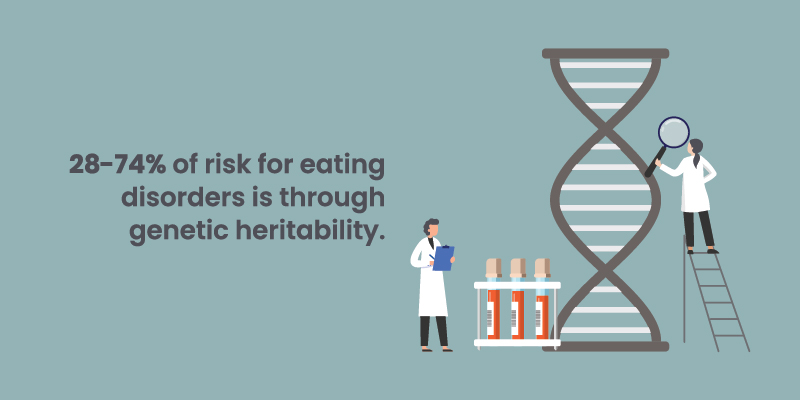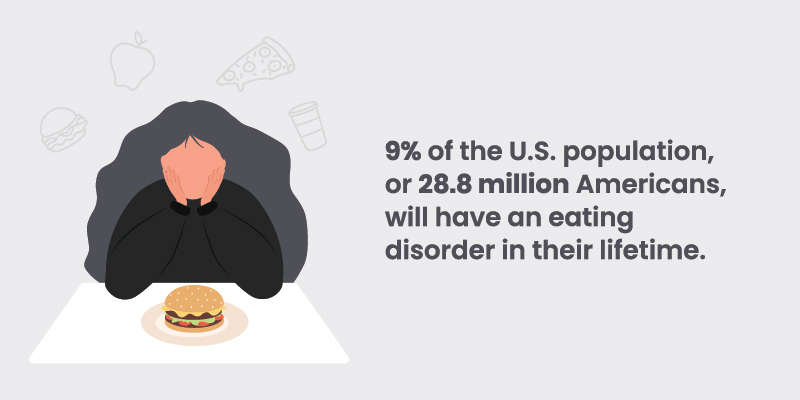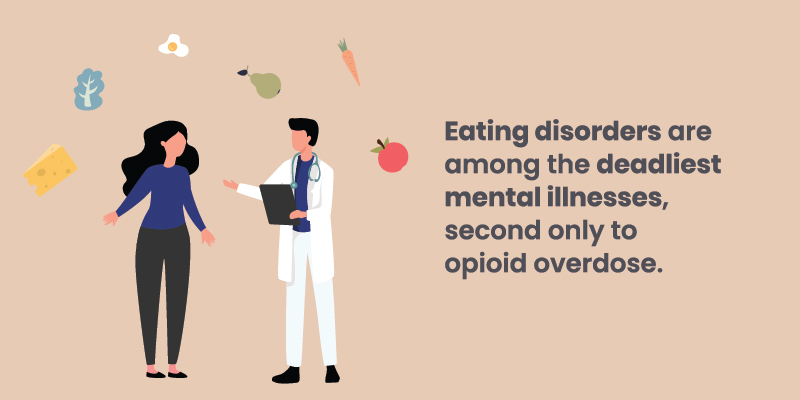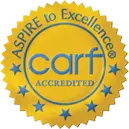The Role of an Eating Disorders Clinic During Recovery
Table of Contents
What Are Eating Disorders?
Eating disorders are complex mental health conditions with serious physical and emotional consequences. Finding help and support at an eating disorders clinic can help individuals work through their symptoms for holistic healing.

Questions About Treatment?
Let us guide you through your options and treatment opportunities. Contact Alternative Options today.
More About Eating Disorders
Eating Disorders: A Brief Overview
Types of Eating Disorders
Anorexia Nervosa
Bulimia Nervosa
A Closer Look at Bulimia Nervosa
Binge Eating Disorder
Binge eating disorder is closely linked to emotional distress. Those affected might use food to cope with stress, anxiety, or depression.
Avoidant/Restrictive Food Intake Disorder (ARFID)
Concerns about body weight or shape do not primarily drive this disorder. Many ARFID cases coexist with mood, anxiety disorders, and autism spectrum conditions.
Other Specified Feeding or Eating Disorders (OSFED)
OSFED encompasses a range of eating disorders that don’t fit the strict criteria of the eating disorders listed above. This category includes conditions like atypical anorexia (characterized by significant weight loss but not meeting all criteria for anorexia), subthreshold bulimia, and night-eating syndrome.

Risk Factors for Eating Disorders
- Genetic Predisposition: There’s evidence to suggest that genetics can play a role in susceptibility to eating disorders. Individuals with a family history of eating disorders or mental health conditions might be at a higher risk.
- Neurobiological Factors: Brain chemistry and neurotransmitter imbalances can influence mood regulation, impulse control, and appetite regulation.
- Psychological Factors: Psychological aspects such as low self-esteem, perfectionism, body dissatisfaction, and a history of trauma can contribute to disordered eating behaviors.
- Cultural and Societal Pressures: Societal ideals of beauty and thinness, perpetuated by media and cultural norms, can lead to body dissatisfaction and a desire to conform to unrealistic standards.
- Dieting and Weight Control: Restrictive diets, attempts to lose weight, and an unhealthy focus on weight and appearance can cause disordered eating patterns and behaviors.
- Peer and Family Influences: Family dynamics, peer pressure, and social interactions can contribute to developing disordered eating habits as individuals seek acceptance and validation.
- Stress and Coping Mechanisms: Stressful life events, transitions, or difficulties can lead individuals to use disordered eating behaviors to cope.
Role of an Eating Disorders Clinic
An eating disorders clinic is pivotal in the comprehensive care and treatment of individuals struggling with these disorders. With their specialized focus, these clinics offer a wide range of services that address each eating disorder’s unique physical, psychological, and emotional aspects.
Multidisciplinary Approach to Treatment
Assessment and Diagnosis
Individualized Treatment Plans
Psychotherapy and Counseling
Psychotherapy, particularly cognitive-behavioral therapy (CBT), is a cornerstone of eating disorder treatment. An effective eating disorders clinic often offers individual and group therapy sessions to address distorted thought patterns and the emotional aspects contributing to the disorder.
Nutritional Guidance and Meal Planning
Medical Monitoring and Intervention
Holistic Wellness Approach
An eating disorders clinic often takes a holistic approach considering the person’s health and well-being. This can include yoga, art therapy, or mindfulness meditation. The goal is to promote stress reduction and overall wellness.

Importance of Early Intervention
Early intervention can also help with co-occurring disorders, as 97% of individuals hospitalized for an eating disorder had a dual diagnosis.5
Impact on Long-Term Recovery
Identifying Warning Signs and Seeking Help
Signs of an Eating Disorder
Breaking the Cycle of Unhealthy Behaviors
Benefits of an Eating Disorders Clinic
Structured Support
Accountability
Safe Space
Peer Support
Interacting with others on a similar journey fosters a sense of community and shared understanding. Peer support within clinics can combat feelings of isolation and remind individuals that they are not alone in their struggles.
Long-Term Strategies
Reduces Health Risks
Improved Quality of Life
Relapse Prevention

Choosing the Right Eating Disorders Clinic
Research and Evaluation
Credentials of Healthcare Professionals
Treatment Approaches Offered
Different clinics may offer varying treatment approaches, such as cognitive-behavioral therapy, dialectical behavior therapy, family therapy, or mindfulness-based interventions.
Location and Accessibility
Patient Reviews and Testimonials
The Future of an Eating Disorders Clinic
Advances in Treatment Methods
Integration of Technology in Therapy
Increasing Awareness and Reducing Stigma

Get the Help You Need at Alternative Options
What Do We Offer?
- Individual therapy
- Group therapy
- EMDR or somatic therapy
- Holistic therapies, like art therapy or meditation
- Food normalization
- Trauma groups
- Supported meals and snacks
- Self-esteem or body image groups
Get in Touch Today
Recovery is possible in various forms, and at Alternative Options, we’re committed to helping you find the one that resonates with you. Contact us today to embark on a transformative journey toward a brighter, healthier future.
Resources
1 https://www.psychiatry.org/patients-families/eating-disorders/what-are-eating-disorders
2 https://www.nimh.nih.gov/health/topics/eating-disorders#part_2267
4 https://www.nationaleatingdisorders.org/treatment/types-psychotherapy
5 https://www.nationaleatingdisorders.org/statistics-research-eating-disorders



